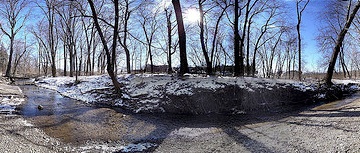A few weeks ago a friend suggested that I consider a position at a small liberal arts college here in Minnesota. As a consequence, I’ve been thinking quite a bit about my own relationship to academe. My career as a librarian has been spent serving large research libraries at two very different institutions, MIT and the University of Minnesota. But for the past three years or so I’ve been on my own, doing consulting work, making way for something new.
The first question I asked myself was whether I was really trying to escape the academy. I have all sorts of stories I tell myself about why I left the security of my position at the U of M to strike out on my own as a consultant. Some of these may even be true! But what if it boils down to disillusion with higher education, with the mission of the university? If that were the case, the last thing I should consider is re-entering an academic institution.
The answer, after some reflection (and one particularly long walk along the Mississippi), is that I still believe in the mission, but I began to recognize the different shades this mission takes on at different institutions of higher education. My undergraduate experience at Yale was really more complex than I’d realized. Although Yale is a research university, the Yale College experience I’d had was more like that of a liberal arts college than of the research universities I’d been serving as a librarian. My undergraduate experience was much more about discovering who I was and what I believed in than preparing me for any specific work or career. Activities like letterpress printing and peace protests were just as formative and critical to this experience as classes with Jonathan Spence or Serge Lang.
In my reflection I came across this passage by Wendell Berry:
The thing being made in a university is humanity. … [W]hat universities … are mandated to make or to help to make is human beings in the fullest sense of those words—not just trained workers or knowledgeable citizens but responsible heirs and members of human culture.
I am very curious to read Harry Lewis’ Excellence Without a Soul, where he writes “The students are not soulless, but their university is.” Mary returned from a conference last week in Denver with an image Parker Palmer apparently used to refer to the soul: the soul is a wild creature within us, shy and reluctant to appear, easily startled, which we coax to light with gentle attention and carful nurture. The soul is easily crowded out by the busy concerns of daily life or, in this case, departmental demands and course requirements.
I realized as I reflected, that the academic library could nurture the soul of the scholar. Libraries can be more than just an archive of books, we can be stunning shared architecture, we can be art, conversation, performance, serendipitous discovery. We are a quite woods in the bustle of academe’s demands, a place of contemplation and self-discovery, with the whispers of lives bound to page or pixel all around us.
With this I realized that I was not running from academe, I just want to engage it in an environment that cares as much for the soul of the scholar as it does for the job prospects, research results, or test scores of the scholar. I suppose this is a bit romantic, and possibly naive. Still, I decided to apply for the position and see whether a smaller liberal arts institution might be able to teach me something about nourishing the soul and raising “responsible heirs and members of human culture.”

